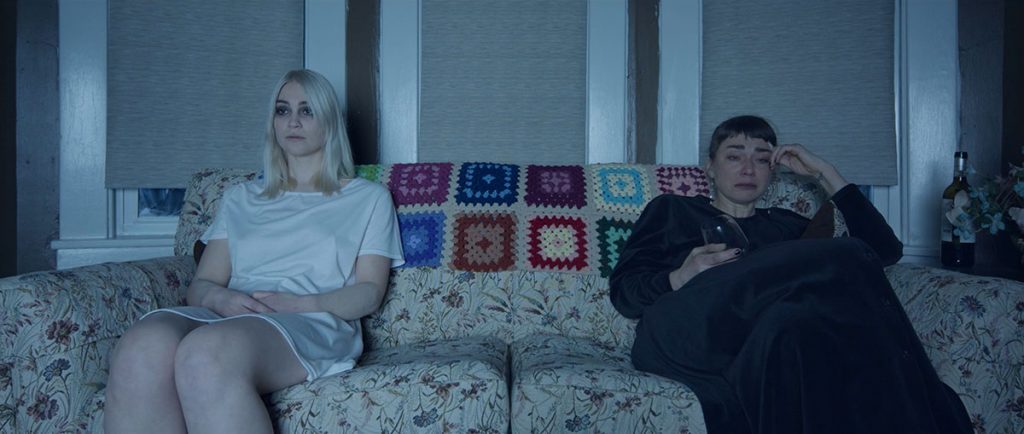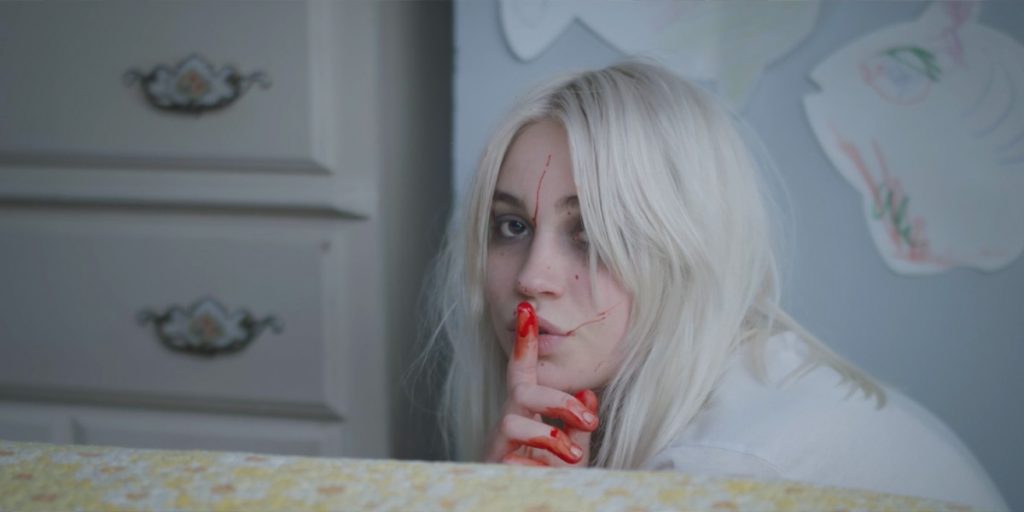Ohio horror indie is light on scares but still entertaining – Colin West’s Double Walker is intriguing conceptually yet fails to fully capitalise on its ideas.
Double Walker, Los Angeles-based director Colin West’s debut feature, is a ghost story with a twist – the unnamed ghost (Sylvie Mix) roams her hometown as she attempts to learn more about her experiences leading up to her own murder. Along the way, she kills abusive men who appear to be responsible for her murder, but comes to re-evaluate her motivations when she meets Jack (Jacob Rice), a compassionate cinema worker who offers her shelter. The most effective horror is that that is latent, and about what’s underneath. Instead of creating a by-the-numbers ghost story, the film explores the themes of sexual abuse and domestic violence.
The film has emerged during perhaps the most exciting period for ‘female horror’ in cinema history, following films like A Girl Walks Home Alone at Night (Amirpour, 2014), Prevenge (Lowe, 2016) and Censor (Bailey-Bond, 2021) in a year where Julia Ducournau (Raw) won the Palme d’Or for her body horror film Titane (2021). Written by West from a story by himself and Mix, this low-budget psychological horror is original in its concept and never boring for a second.
West’s direction is competent, but there are several aspects of the film that I feel are a bit lacking. West also acted as cinematographer, and perhaps the most distinctive feature of his film visually is the extensive use of slow pans to convey the serenity of the setting. Besides a few establishing shots towards the beginning, there aren’t many wide shots – I do feel that more could have been done to isolate the ghost, and images of the quiet urban landscapes would have helped achieve this. Much of the eeriness comes from its setting – West and Mix’s hometown of Columbus, Ohio, in the height of winter, when it is snowing, and I did like the atmosphere-building. The film uses the image of a bedraggled girl alone in a forest in the cold to create initial intrigue and peril – this is a harsh, uncaring world.
For all its exciting original aspects, Double Walker unfortunately does use a few tired clichés, the most egregious being its use of the dancing ballerina music-box, which is a bit of a clumsy motif. The twinkly notes and slowly turning ballerina are used far too often in horror to create eeriness, mostly from the uncanny valley and by condensing an art form into a robotic toy devoid of agency, but it really has no effect here. The film uses intertextuality with Scrooge (Edwards, 1935), specifically regarding the ghost of Jacob Marley, to allude to the idea of past and present beings meeting – Double Walker is also set around Christmas time, with the ghost’s mother (Maika Carter – Mix’s real mother), pushing the family Christmas tree over at the beginning providing a distressing image – we’ll learn later why she’s become so disillusioned with her family life.

The ghost walks around with a waif-like gait and a gormless lack of urgency that makes it difficult for us to decode her motivations and emotions. The clever juxtaposition between the cultivated look of bleach-blonde hair and Taylor Momsen-esque eyeshadow and her bland casual attire, not fit at all for such a cold winter, suggests that the ghost is somehow compromised, and not quite on the same wavelength as everyone else. Mix is weirdly charismatic as the ghost – even as she sits still on a settee, shrouded in thick blankets, or dawdles down the street at night, there is an underlying agency and potency to her, yet at the same time she appears so delicate and vulnerable physically – even though she literally cannot die.
It isn’t until 20 minutes in that she speaks diegetically for the first time, a feeble “thank you” to Jack, who gives her a hot drink. Jack is the first man who offers her help without an ulterior motive, and while the ghost still seems vacant, she trusts him. The ghost hardly speaks at all, with most of her dialogue being narration. Despite this, Mix communicates a lot with her character’s countenance, make-up and costuming – she seems aloof yet there is undeniably something elusive about her. Her skin and hair are almost as pale as the snow falling – there is no need for any visual effects to tell us she’s a ghost.
Double Walker’s screenplay is rather unremarkable (the dialogue is by no means bad, but there’s nothing that really stands out), but tonally it’s well-judged. There is next to no comedy, and it does evoke pathos in depiction of the ghost’s relationship with her mother, but unfortunately this is underdeveloped; there’s just not enough screen time of the two together, and the two don’t say a lot to each otehr. I felt that the scenes with the ghost’s former self as a child were much more effective because there was a clearer dynamic. That’s really the main issue with the film – it introduces fascinating concepts but it doesn’t flesh out these aspects as much as it could. The relationship between mother and daughter makes it stand out from your average slasher flick, but the dynamic should have been explored in more depth. West and Mix are trying to explore issues of intergenerational trauma, and to what extent abuse may beget abuse, but its commentary is limited.
Given how the film portrays most of its men (namely the ghost’s father and two of the men who prey on her), I do wish it had explored themes of gender more. Unfortunately, those characters are quite two-dimensional, and the man who picks her up at a bar (probably thinking she’s a prostitute) is just a vulgar caricature. The marriage between the ghost’s parents is abusive (and it’s clever how the film suggests that the killer may be her father), but the mother just doesn’t have enough of a voice for us to know about their relationship in more detail. She just seems like a victim – which she may well be, but I wish we found out more about the husband’s motivations.
One of the film’s biggest strengths, however, is how it isn’t bogged down by excessive lore and exposition. Too many horror/fantasy films want you to know everything about their universe and are desperate to avoid plot holes but end up becoming boring and verbose. If anything, I wish Double Walker explored its fantasy world more – when the ghost says that she was given the choice of living one more day as a human or forever as a ghost (“I chose the latter”, she tells us nonchalantly), it provides an interesting proposition that could open up a lot of philosophical discussion, but the concept just isn’t really explored beyond a surface level of being ‘dead’ – it’s such a complex matter that it really shouldn’t have been constricted to just a few lines.
The film’s climax is satisfying – it ties up several loose ends and made me really re-evaluate the ghost, while it is also somewhat open to interpretation. Everything does feel a bit rushed though, and I wish the character of Jack was more integrated into the ending, as he is a very engaging presence for much of the film. Ultimately, it’s a tragic story. A girl has been murdered, her mother cares deeply for her yet she herself has suffered extensive abuse, and even when she’s dead, the girl is still taken advantage of. Double Walker is an enjoyable psychological horror that isn’t very scary yet always compelling thanks to an intriguing mystery at its core and a sympathetic lead.
Double Walker is now available to watch on digital and on demand.

